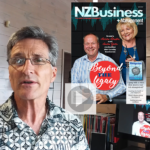Drawing comparisons
What does it take to start a successful web-based comparative site? Denis Tyurkov and Michael Speight may well have mastered the art with Glimp. It has to be the dream […]
What does it take to start a successful web-based comparative site? Denis Tyurkov and Michael Speight may well have mastered the art with Glimp.
It has to be the dream of everyone who ‘sells time’ to earn a living: to have a business which earns them income while they aren’t ‘at work’.
Such was the goal of two young immigrant entrepreneurs – turning their backs on secure jobs and taking the bold step of betting they could get their comparative website sufficiently profitable to pay their salaries before their savings ran out.
They received no external investment, and yet today are ranked first on Google’s first page for ‘related terms’. All on a small marketing budget.
The founders of Glimp, Denis Tyurkov and Michael Speight, come from very different backgrounds, which have proven to be complementary.
Denis was “snoozing his way” through Avondale College and Westlake Boys High in the first three years after arriving from Russia in 2005, and then through a commerce degree at Auckland University.
Michael had qualified as an electrician in the UK and later worked as a project manager, then as facilities manager.
A mutual need for change took them simultaneously to web development courses in Wellington, where the seeds for Glimp (‘Glimpse’, minus the ‘se’) were sown.
“I feel a lot of kids make that mistake of going with the flow when they go to uni,” says Denis. “I majored in accounting because my parents recommended it, and my mum was a successful one in Russia; so I just went with it.
“This was interesting for me considering they are both entrepreneurs from the get-go; so maybe that’s where I got the inspiration to try to do something of my own?”
His career in commerce was apparently secured with an auditing job with BDO, while he earned his CA. With six months to go to that qualification, he threw in the towel and with his three-and-a-half years’ of savings moved to Wellington to begin “a nine-week intense web development boot-camp, doing more than 1,000 hours of coding”.
Michael covers the spark that ignited at that time.
“From the time I arrived from the UK in 2011, I’d had the idea of meeting the need for a multi-utility comparison website here. Denis, who bubbles with great ideas all the time, and I quickly decided to focus on solving a problem which millions of people have each day – finding services or products in a quick and simple way, with all the information there for them to make an informed decision, quickly.
“Essentially, our mission is for our customers to save time and hopefully money. So we attach huge importance to the core fundamental of always having a simple, easy-to-use website.”
Denis admits to always having had an issue of generating too many ideas. “I could now focus that gift on what we needed to do and come up with various visual and customer-experience insights for the website.
“Being an avid gamer, I knew more about the Internet and where it is going rather than any other industry.
“I also have a talent for reverse-engineering things and applying it to whatever I am doing. I’d like to think it helps a lot with what we are trying to achieve right now.”
Growth-hacking
Michael brought his previous business experience to Glimp – that covered the importance of cashflow; the legal and accounting side of setting companies up; negotiation and rapport-building skills; along with attention to detail, problem-solving and sales skills.
Being time-rich and cash-poor helped Denis and Michael focus on areas like marketing, where they had no formal experience. They researched, tested and improved concepts to get a firm understanding, before being prepared to scale them; thereby not wasting vital cash reserves. They call it ‘growth-hacking’ – growing a business through a process of rapid, conventional and unconventional experimentation across marketing channels and product development – to identify the most effective, efficient ways to grow a business.
They were also smart with data to find out which areas their dollars would be best spent.
“We started on a $10-a-day budget,” Michael says, “which is non-existent considering what big players in the industry spend. In development costs alone we would have spent close to a million dollars, had we outsourced what we’ve built. Until November last year we each lived on $200 to $300 a week.”
Denis believes unconventional thinking and not following the herd when it came to marketing gave them a head-start.
“We knew the concept would work when we initially started with comparing broadband services. So we followed a hunch and rather than waste time validating the idea we started to pitch it to Internet Service Providers.
“We literally hit all their social channels, walked into head offices, rang customer service numbers to find the people we needed to talk to. We eventually got there and then arranged meetings to pitch what we were doing and how it could benefit their businesses.”
Credit cards and beyond
After successfully launching the broadband website, they followed with power. Next came credit cards. It seemed like an easy and logical step into financial markets. Michael says they had to research what drove people to make decisions when choosing a credit card and then reverse-engineer the solution, so as to help match personal needs to the best-suited credit card available.
“Essentially, it is a foot in the door for other services, so we just launched it. The information we get is publicly available and currently all done manually. This includes broadband, power and credit cards. However, we aim to automate that. A huge amount of manual tasks have been automated. We want technology to do the heavy lifting.”
Denis wraps up their plans for Glimp. “We are shaking up the various industries and in the way they acquire business. Consequently, there could be an impact on various sales channels, such as call centres. Especially as we become number one.
“Travel insurance is our next move. Car insurance, mortgages, life insurance are all in the pipeline. But we will always stay totally committed to our mission of saving people time.
“To that end we constantly fine-tune the user experience of the site, so users have the best possible experience with as little friction as possible when they want to sign up to one of our providers.”


